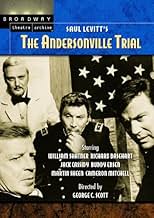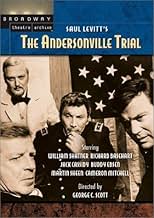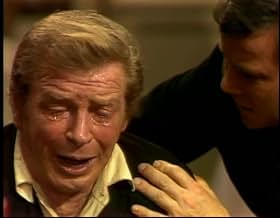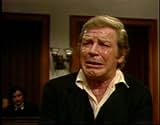Ajouter une intrigue dans votre langueA dramatization of the 1865 war-crimes trial of Henry Wirz, commandant of the notorious Confederate POW camp at Andersonville, Georgia.A dramatization of the 1865 war-crimes trial of Henry Wirz, commandant of the notorious Confederate POW camp at Andersonville, Georgia.A dramatization of the 1865 war-crimes trial of Henry Wirz, commandant of the notorious Confederate POW camp at Andersonville, Georgia.
- A remporté 3 prix Primetime Emmy
- 4 victoires et 2 nominations au total
Dal McKennon
- First Guard
- (as Dallas McKennon)
William Bryant
- The Lieutenant
- (as Bill Bryant)
Avis en vedette
10Pegapus
Back in 1998, I submitted the below review of The Andersonville Trial. Over the course of years, I searched for a video copy of the show, and finally paid a high price for it at eBay! Now, however, and finally, reason has triumphed, and this excellent presentation is available on DVD. I urge fans of this production to get DVDs of the show, and preserve its memory in your DVD library. As a top-notch and award winning drama, it is only when patrons support quality television like this that we can hope for even greater committments to such fare on the "boob tube." If we are prepared to support schlock on television and not shows like The Andersonville Trial, we will be left with nothing to preserve for TV generations to come.
This presentation is one of the most compelling dramas ever filmed for television. It was directed by George C. Scott, and includes great performances by such performers as Cameron Mitchell, William Shatner, Jack Cassidy, Albert Salmi and Richard Basehart.
It is the story of one of the few post Civil War trials, of the "commandant" of the POW camps at Andersonville. The conditions of the compound were horrible, and Henry Wirz (Richard Basehart)was charged after the war for terrible treatment of the prisoners.
Every performance in the presentation is excellent--it is great to see so many fine performers work together.
This presentation is one of the most compelling dramas ever filmed for television. It was directed by George C. Scott, and includes great performances by such performers as Cameron Mitchell, William Shatner, Jack Cassidy, Albert Salmi and Richard Basehart.
It is the story of one of the few post Civil War trials, of the "commandant" of the POW camps at Andersonville. The conditions of the compound were horrible, and Henry Wirz (Richard Basehart)was charged after the war for terrible treatment of the prisoners.
Every performance in the presentation is excellent--it is great to see so many fine performers work together.
Based on a Broadway play, THE ANDERSONVILLE TRIAL was a made for television production directed by George C. Scott with a number of major performances, led by William Schatner as the Union Prosecutor, and Jack Cassidy as the Southern born defense counsel for Confederate Captain Henry Wirtz (Richard Basehart). The court-martial is headed by General Lew Wallace (Cameron Mitchell), who is determined to bring in a speedy, clean-cut verdict as quickly as possible. Among the witnesses is Albert Salmi, a Union soldier who survived the camp, but who has a dirty secret that clever Jack Cassidy pushes into the faces of the court-martial judges.
Historically some 49,000 Union prisoners were sent to Andersonville, and 13,000 died there under hideous conditions. Food was scarce. They had little in the way of proper shelter. The camp's sanitation was non-existent.
Who was to blame? Well, at the time blame was on Captain Wirtz, who was commander of the camp. All decisions for the sake of the men were in his hands, and the number of dead was too large to ignore. However, the Confederacy in 1863-65 was having trouble feeding it's troops and it's people. Wirtz actually tried to get supplies, but couldn't get far on that. Also, Northern prisons for Confederate prisons, such as Elmira in New York State, were equally vile. Finally, attempts by the South to get a trade of captured soldiers with the North ground to a halt due to the combined refusal of General Grant or Secretary of War Stanton to agree to it (they reasoned the released trained southern soldiers would resume war work, and lengthen the course of the war).
Wirtz would be found guilty, and would be hanged in November 1865. He was the only Confedrate hanged for a war crime (unless you count the four Lincoln Assassination defendants). The play tries to show the impossible situation that fell on Wirtz's shoulders, with him trying to balance his duty to the southern cause, his duty to his prisoners, and his fears of those prisoners. Basehart's agonizing testimony on the stand, where he keeps thinking of the prisoners tunneling and tunneling out of the camp, is still a memory to me yet, thirty five years after I saw it the first time.
But there is more than that in the play. The scene where Mitchell is trying to get the prosecution to concentrate only on the facts, and not give rise to a theory of unchecked universal evils ("A world of Andersonvilles", as Shatner puts it)is wonderful. Mitchell is trying to remind Shatner that all he has to do is prove a case against this defendant. Finally, in disgust, Mitchell asks a hypothetical question to test the loyalty of Shatner to the U.S.: What if the U.S. had supported slavery in 1860 and the South supported abolition? Shatner shatters Mitchell by insisting a greater loyalty would dictate supporting the Confederacy.
Jack Cassidy has some terrific moments attacking the prosecution, which he rightly considers a show trial and an act of hypocrisy. He even gets under Shatner's skin at one point by showing how Shatner - if he gets a conviction - will have something to build a political career on.
All in all it was a terrific moment of televised drama. It has been shown occasionally and it should be shown more.
Oh, by the way. I mentioned the Northern Prison Camp at Elmira, NY. It's commander was Benjamin Tracy. In the post war eras (he died in 1917), Mr. Tracy became a successful corporate lawyer, leading New York State Republican, and Secretary of the Navy under President Benjamin Harrison (1889 - 1893). He is considered by some the father of the modern U.S. Navy. Wirtz, his opposite number, was hanged. Sometime in the 1950s or so, his grave received a new tombstone from some unknown supporter. It gives his name, dates of birth and death, and puts under it, "C.S.A. Martyr". I leave it for the reader to decide what was justice or what wasn't.
Historically some 49,000 Union prisoners were sent to Andersonville, and 13,000 died there under hideous conditions. Food was scarce. They had little in the way of proper shelter. The camp's sanitation was non-existent.
Who was to blame? Well, at the time blame was on Captain Wirtz, who was commander of the camp. All decisions for the sake of the men were in his hands, and the number of dead was too large to ignore. However, the Confederacy in 1863-65 was having trouble feeding it's troops and it's people. Wirtz actually tried to get supplies, but couldn't get far on that. Also, Northern prisons for Confederate prisons, such as Elmira in New York State, were equally vile. Finally, attempts by the South to get a trade of captured soldiers with the North ground to a halt due to the combined refusal of General Grant or Secretary of War Stanton to agree to it (they reasoned the released trained southern soldiers would resume war work, and lengthen the course of the war).
Wirtz would be found guilty, and would be hanged in November 1865. He was the only Confedrate hanged for a war crime (unless you count the four Lincoln Assassination defendants). The play tries to show the impossible situation that fell on Wirtz's shoulders, with him trying to balance his duty to the southern cause, his duty to his prisoners, and his fears of those prisoners. Basehart's agonizing testimony on the stand, where he keeps thinking of the prisoners tunneling and tunneling out of the camp, is still a memory to me yet, thirty five years after I saw it the first time.
But there is more than that in the play. The scene where Mitchell is trying to get the prosecution to concentrate only on the facts, and not give rise to a theory of unchecked universal evils ("A world of Andersonvilles", as Shatner puts it)is wonderful. Mitchell is trying to remind Shatner that all he has to do is prove a case against this defendant. Finally, in disgust, Mitchell asks a hypothetical question to test the loyalty of Shatner to the U.S.: What if the U.S. had supported slavery in 1860 and the South supported abolition? Shatner shatters Mitchell by insisting a greater loyalty would dictate supporting the Confederacy.
Jack Cassidy has some terrific moments attacking the prosecution, which he rightly considers a show trial and an act of hypocrisy. He even gets under Shatner's skin at one point by showing how Shatner - if he gets a conviction - will have something to build a political career on.
All in all it was a terrific moment of televised drama. It has been shown occasionally and it should be shown more.
Oh, by the way. I mentioned the Northern Prison Camp at Elmira, NY. It's commander was Benjamin Tracy. In the post war eras (he died in 1917), Mr. Tracy became a successful corporate lawyer, leading New York State Republican, and Secretary of the Navy under President Benjamin Harrison (1889 - 1893). He is considered by some the father of the modern U.S. Navy. Wirtz, his opposite number, was hanged. Sometime in the 1950s or so, his grave received a new tombstone from some unknown supporter. It gives his name, dates of birth and death, and puts under it, "C.S.A. Martyr". I leave it for the reader to decide what was justice or what wasn't.
This is one of those rare presentations that one remembers, not only the content, but also the feelings and thoughts that it evoked, even decades after viewing. This is the very best courtroom drama I have ever seen. The captains of the Enterprise and whatever the name of the sub was on Voyage to the Bottom of the Sea (Shatner and Basehart) show what they were capable of doing with first-rate material and direction. Set aside some uninterrupted time to see this one.
A wonderful TV movie about the most notorious of the "concentration camps" of the American Civil War. It has a first-rate cast, with Richard Basehart giving an especially intense performance as the camp commandant. I hope some day it comes out on video or is rebroadcast, perhaps by the History Channel.
I only wish they would put this film out on video because it is one that truly deserves to be called a classic. Forget The Caine Mutiny and A Few Good Men. This is the best and most riveting courtroom thriller ever made. I always thought of William Shatner as a blowhard who couldn't act his way out of a paper bag, but here maybe for the only time, he gives an excellent performance as the prosecutor with a heart determined to bring this man to justice. Andersonville really was a hell on earth and the descriptions of it they give here will give you chills. The best scene is the one where Shatner cross examines Richard Basehart and keeps asking him why he didn't disobey orders if it could have saved so many innocent lives. What gets me is that Basehart's character (Captain Wirz) keeps insisting that he was only obeying orders. This is the same excuse that the Nazis and the Nuremberg War Crimes Trials used. You keep wondering if this man really has no soul. George C. Scott played the prosecutor in the Broadway version and does a wonderful job of directing it. This was made at about the same time that he made Patton I believe. This is a great film with a first rate cast. I only wish it could be seen more often.
Le saviez-vous
- AnecdotesAll of the witnesses as portrayed in the film are the actual witnesses who testified at Wirz's trial, and their dialogue in many cases is taken almost verbatim from the trial transcript. The major change from history is that Wirz did not testify and the whole "moral issue", around which this film revolves, was never raised at the trial.
- GaffesEarly on, a captain played by Martin Sheen comes into the court to tell Gen. Wallace that the defendant tried to hurt himself. The crossed sabers insignia of the cavalry on Sheen's cap is upside down.
- ConnexionsFeatured in The 23rd Annual Primetime Emmy Awards (1971)
Meilleurs choix
Connectez-vous pour évaluer et surveiller les recommandations personnalisées
Détails
Contribuer à cette page
Suggérer une modification ou ajouter du contenu manquant





































